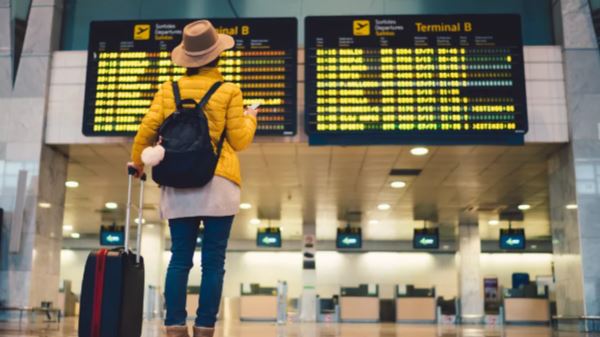As the festive season approaches, few things put a damper on travel plans like a delayed or cancelled flight.
While some travel hiccups are unavoidable, savvy planning can help reduce the chances of disruption and minimise your chances of ending up stuck at the airport.
Travelling during peak season has its fair share of ups and downs, however, being mentally prepared for these hurdles will make sure you have an enjoyable journey no matter the weather.
If you’re planning to be out and about or globe-trotting this summer, Flight Centre South Africa’s travel experts shared a few tips on how to stack the odds in your favour when booking your next flight.
1. Don’t book the last flight of the day
According to the travel agency’s customer experience leader, Lynette Machiri, the golden rule is not to book the last flight of the day.
“If you’re able to avoid it, never book the last flight of the day. While late-night flights might seem convenient after a long day of sightseeing, there’s less margin for error.
“If a flight is delayed or cancelled after-hours, you’ll find yourself with fewer options to rebook the same day,” Machiri advised.
She added that earlier flights offer more flexibility should anything go wrong, with plenty of connections and alternative flights during the day.
2. Direct is best
While often pricier, non-stop flights should always be your first choice if you’re aiming to reduce risk.
“Transit points increase the chance of something going wrong. Layovers open the door to delayed connecting flights or even misplaced luggage. When possible, pay a bit more upfront for a direct connection – you might just thank yourself later,” she said.
The expert also said that one way to avoid any delays due to layovers but still benefit from the non-direct airfare is to opt for a stopover.
“If your layover is long enough, visa requirements permitting, one with a stopover can be a great way to maximise travel over the peak season, explore an extra destination and ‘avoid’ the long layovers stuck at the airport,” said Machiri.
3. Research your route and airline
The expert also added that some routes and airlines consistently perform better than others for on-time arrivals so knowing your airline’s on-time performance record can be a game changer.
“Some airlines have a better track record with punctuality than others. Before booking check if your chosen route is prone to weather-related delays. Research airline performance records and consider the reputation of both the carrier and the airports you’ll use,” she advised.
Machiri highlighted that websites like FlightStats or Skytrax make it easier to assess various airlines’ reliability. “A little extra research upfront can help cut down the frustration later,” she said.
4. Book for off-peak
According to the travel service provider’s general manager, Antoinette Turner, flight delays are more likely during peak travel times so avoid major holidays or school holidays when airports are stretched to full capacity and more prone to back-ups.
She added that while many travellers might not have the flexibility to skip busy seasons entirely, booking flights outside rush-hour windows – typically the late afternoons – can help you avoid the worst delays.
5. Insurance is your best friend
Turner highlighted that even the best-laid plans can hit a snag which is why travel insurance is important. She said that if you haven’t invested in decent coverage, you could be left in the lurch when you least expect it.
“Ensure your travel insurance covers you for unexpected delays or cancellations. Although travel insurance can’t prevent a disruption, it can at least cushion the financial blow,” said Turner.
She also highlighted that many travellers mistakenly think their credit card or medical aid covers everything, but free cover is often limited.
“We recommend Travel Insurance Consultants (TIC) to ensure you are adequately covered, whether you’re looking for comprehensive leisure insurance, business cover, local insurance or a sports inclusion. A travel expert can assist you with this when booking,” she added.
6. Timing is everything
Machiri noted that timing is key when booking flights.
“There’s a sweet spot. Booking too far in advance may leave you overpaying, while waiting until the last-minute puts you at the mercy of higher prices and limited choices,” said the expert.
She advised getting your domestic flights booked around six months ahead and international flights up to 12 months if possible.
“Planning early also allows you to get your preferred seating as you may have to pay extra for this, depending on your chosen seat or airline– which, for some, could mean getting closer to the front of the plane for a quicker exit and smoother transit,” she said.
7. Verify entry and identification requirements
Turner noted that they often urge their customers to properly confirm visa guidelines and check that passports and other required documentation are valid well beforehand.
“Entry requirements frequently change, so it’s crucial to recheck as your departure date approaches,” she said.
8. Work with reputable travel experts
The travel experts noted that having knowledgeable support can make all the difference when plans go awry.
“A travel expert can help you navigate disruptions, find alternative options, and provide guidance every step of the way,” said Turner.
She advised travellers to book with accredited members of the Association Of Southern African Travel Agents (Asata), who adhere to a Code of Conduct and Constitution, to avoid falling victim to possible scams or fly by night operations.
“Asata represents, vets and promotes professional service in the travel industry. More than 95% of South Africa’s travel industry belongs to Asata,” said Turner.
